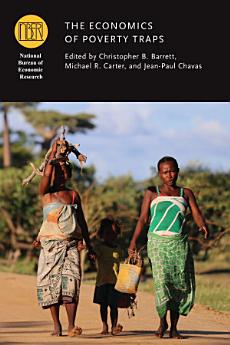The Economics of Poverty Traps
Christopher B. Barrett · Michael R. Carter · Jean-Paul Chavas
мај 2024. · University of Chicago Press
E-knjiga
414
Stranica
family_home
Ispunjava uslove
info
reportOcene i recenzije nisu verifikovane Saznajte više
O ovoj e-knjizi
What circumstances or behaviors turn poverty into a cycle that perpetuates across generations? The answer to this question carries especially important implications for the design and evaluation of policies and projects intended to reduce poverty. Yet a major challenge analysts and policymakers face in understanding poverty traps is the sheer number of mechanisms—not just financial, but also environmental, physical, and psychological—that may contribute to the persistence of poverty all over the world.
The research in this volume explores the hypothesis that poverty is self-reinforcing because the equilibrium behaviors of the poor perpetuate low standards of living. Contributions explore the dynamic, complex processes by which households accumulate assets and increase their productivity and earnings potential, as well as the conditions under which some individuals, groups, and economies struggle to escape poverty. Investigating the full range of phenomena that combine to generate poverty traps—gleaned from behavioral, health, and resource economics as well as the sociology, psychology, and environmental literatures—chapters in this volume also present new evidence that highlights both the insights and the limits of a poverty trap lens.
The framework introduced in this volume provides a robust platform for studying well-being dynamics in developing economies.
The research in this volume explores the hypothesis that poverty is self-reinforcing because the equilibrium behaviors of the poor perpetuate low standards of living. Contributions explore the dynamic, complex processes by which households accumulate assets and increase their productivity and earnings potential, as well as the conditions under which some individuals, groups, and economies struggle to escape poverty. Investigating the full range of phenomena that combine to generate poverty traps—gleaned from behavioral, health, and resource economics as well as the sociology, psychology, and environmental literatures—chapters in this volume also present new evidence that highlights both the insights and the limits of a poverty trap lens.
The framework introduced in this volume provides a robust platform for studying well-being dynamics in developing economies.
O autoru
Christopher B. Barrett is the Stephen B. and Janice G. Ashley Professor of Applied Economics and Management, professor of economics, and International Professor of Agriculture at Cornell University, where he also serves as deputy dean and dean of academic affairs at the S.C. Johnson College of Business.
Michael R. Carter is professor of agricultural and resource economics at the University of California, Davis, and directs the Feed the Future Innovation Lab for Assets and Market Access and the Index Insurance Innovation Initiative (I4). He is a fellow of the Bureau for Research and Economic Analysis of Development and the American Agricultural Economics Association and a research associate of the NBER.
Jean-Paul Chavas is the Anderson-Bascom Professor of Agricultural and Applied Economics at the University of Wisconsin–Madison and a member of the board of directors of the NBER.
Michael R. Carter is professor of agricultural and resource economics at the University of California, Davis, and directs the Feed the Future Innovation Lab for Assets and Market Access and the Index Insurance Innovation Initiative (I4). He is a fellow of the Bureau for Research and Economic Analysis of Development and the American Agricultural Economics Association and a research associate of the NBER.
Jean-Paul Chavas is the Anderson-Bascom Professor of Agricultural and Applied Economics at the University of Wisconsin–Madison and a member of the board of directors of the NBER.
Ocenite ovu e-knjigu
Javite nam svoje mišljenje.
Informacije o čitanju
Pametni telefoni i tableti
Instalirajte aplikaciju Google Play knjige za Android i iPad/iPhone. Automatski se sinhronizuje sa nalogom i omogućava vam da čitate onlajn i oflajn gde god da se nalazite.
Laptopovi i računari
Možete da slušate audio-knjige kupljene na Google Play-u pomoću veb-pregledača na računaru.
E-čitači i drugi uređaji
Da biste čitali na uređajima koje koriste e-mastilo, kao što su Kobo e-čitači, treba da preuzmete fajl i prenesete ga na uređaj. Pratite detaljna uputstva iz centra za pomoć da biste preneli fajlove u podržane e-čitače.





